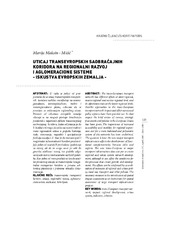Приказ основних података о документу
Uticaj transevropskih saobraćajnih koridora na regionalni razvoj i aglomeracione sisteme - iskustva Evropskih zemalja
| dc.creator | Maksin-Mićić, Marija | |
| dc.date.accessioned | 2018-12-26T10:52:08Z | |
| dc.date.available | 2018-12-26T10:52:08Z | |
| dc.date.issued | 2003 | |
| dc.identifier.issn | 0013-3264 | |
| dc.identifier.uri | https://raumplan.iaus.ac.rs/handle/123456789/53 | |
| dc.description.abstract | The trans-European transport network has different effects at inter-regional, macro-regional and mezzo-regional level, and its effectiveness rises at the lower regional levels. Possible approaches to the trans-European transport network impact and effect survey and policy options have been pointed out. In that respect the brief review of surveys, strategic framework and policies in the European Union has been given. The importance of increased accessibility and mobility for regional expansion and for a more balanced and polycentric system of city networks has been underlined. The question is how the new major transport infrastructure affects the development of functional complementarity between cities and regions. The new trans-European or major transport infrastructure does not per se create regional and urban system network development, although it can affect the conditions for the processes that create growth and development. The effects can be reinforced by co-ordination of measures of regional and urban policy, land use, transport and other policies. The necessary measure is the introduction of spatial impact assessment as an instrument for spatial assessment of large transport infrastructure projects. | en |
| dc.description.abstract | U radu se polazi od pretpostavke da se uticaj transevropskih transportnih koridora različito manifestuje na interregionalnom, intraregionalnom, makro i mezoregionalnom planu, odnosno da se povećava sa snižavanjem regionalnog nivoa. Polazeći od iskustava evropskih zemalja ukazuje se na moguće pristupe istraživanju pozitivnih i negativnih efekata transevropskog saobraćajnog koridora. Jedno od pitanja je da li i koliko oni mogu da utiču na razvoj makro i mezo regionalnih celina u pogledu kretanja, rada, stanovanja, raspodele i specijalizacije funkcija naselja i sl. Stav je da transevropski i magistralni infrastrukturni koridori predstavljaju jedan od značajnih preduslova i podsticaja za razvoj, ali da ne mogu samo po sebi da generišu očekivani razvoj, bez podrške odgovarajućih mera i instrumenata različitih politika. Kao jedna od mera predlaže se izrada analize prostornog uticaja za transevropske i magistralne transportne koridore u procesu sektorskog planiranja i pripreme tehničke dokumentacije. | sr |
| dc.publisher | Faculty of Economics, Belgrade | |
| dc.rights | openAccess | |
| dc.rights.uri | https://creativecommons.org/licenses/by-nc-nd/4.0/ | |
| dc.source | Ekonomski anali | |
| dc.subject | trans-European transport network | en |
| dc.subject | impact | en |
| dc.subject | regional development | en |
| dc.subject | urban system | en |
| dc.subject | indicator | en |
| dc.subject | criterion | en |
| dc.subject | transevropski transportni koridor | sr |
| dc.subject | uticaji | sr |
| dc.subject | regionalni razvoj | sr |
| dc.subject | aglomeracioni sistem | sr |
| dc.subject | indikator | sr |
| dc.subject | kriterijum | sr |
| dc.title | Uticaj transevropskih saobraćajnih koridora na regionalni razvoj i aglomeracione sisteme - iskustva Evropskih zemalja | sr |
| dc.type | article | |
| dc.rights.license | BY-NC-ND | |
| dcterms.abstract | Максин-Мићић, Марија; Утицај трансевропских саобраћајних коридора на регионални развој и агломерационе системе - искуства Европских земаља; Утицај трансевропских саобраћајних коридора на регионални развој и агломерационе системе - искуства Европских земаља; | |
| dc.citation.volume | 44 | |
| dc.citation.issue | 157 | |
| dc.citation.spage | 123 | |
| dc.citation.epage | 134 | |
| dc.citation.other | 44(157): 123-134 | |
| dc.identifier.doi | 10.2298/EKA0357123M | |
| dc.identifier.fulltext | https://raumplan.iaus.ac.rs//bitstream/id/1667/50.pdf | |
| dc.type.version | publishedVersion |

